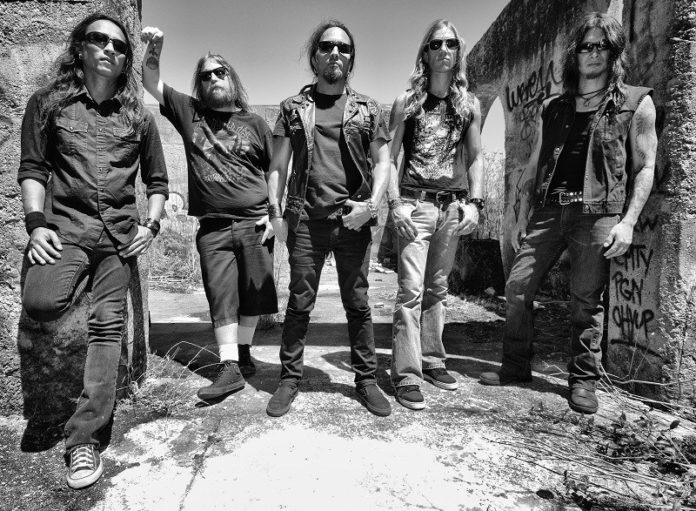
My first interview at Hellfest 2014 was with no other than Death Angel. As a fan, I was pretty excited not just because of the interview, but for a chance of seeing these guys for a second time.
Still riding on the success of last year’s The Dream Calls for Blood, they have a lot to be proud of. They’re one of the few bands that have managed to do a “return” that seemed authentic and just as powerful as ever, and which manage to keep putting out music that stays true to their style. Still, not everything has been perfect lately, and they cryptically announced the cancellation of their European tour.
This, and more, was discussed with Ted Aguilar, the guitarist of this great thrash band.
If we had done the tour the way it was set up, Death Angel would have just imploded. It was in our best interest to pull out.
MB: The Dream Calls for Blood was considered a darker album than what we usually get from Death Angel. What was the mindset that you were in when you worked on it?
Ted Aguilar: It wasn’t planned like this, but it ended up this way. We wanted to make like a sister album to Relentless Revolution, like Metallica’s Ride the Lightning and Master of Puppets or Fear Factory’s Demanufacture and Obsolete; as Rob [Cavestany, guitars] would say, we wanted to make a wicked step-sister, something much darker. As you can see from the lyrics and the music, I think we did it.
Many things played a role in the making of this release. Three years of touring with our peers, like Kreator, Testament, Sepultura, Exodus, being in different parts of the world experiencing different cultures, playing Ultra-Violence in its entirety… it all influenced what what ended up being The Dreams Calls for Blood.
MB: This is the second time your work with Jason Suecof as producer. Considering that you’ve used other producers throughout your career, why did you want to return to him? What was the input that he had on this release?
Ted: Jason is a remarkable, fantastic producer, and a fantastic guitar player with an incredible ear; when we started writing The Dream Calls for Blood we didn’t know if we were going to go back to him, but towards the end of the writing we felt that the album really needed his touch. When we heard the demos we simply knew that he had to do it. It was really comfortable to work with him; we had done it before, in Relentless Revolution, but this time was even more better, like we were just hanging out with him. His input, especially with the guitar, was amazing; we were actually discovering new things with him.
He also co-produced the album with Rob, so that also gave it a little extra something that allowed it to really get in sync with us.
MB: So The Dream Calls for Blood, as it is, wouldn’t exist without Jason?
Ted: It would sound different.
MB: Worse?
Ted: That’s a hard question; I just don’t know. Would it sound better? We will never know.
MB: I read that you were suspending your tour due to some business restructuring. What happened exactly?
Ted: The behind-the-scenes team that we had working with us didn’t make the European tour work financially and logistically for us, so we just had to pull out. If we had to come out here the way it was set up, I think that Death Angel would have just imploded. It was in our best interest to pull out. We also ended our relationship with our manager and our booking agent, but we picked new ones very quickly, so we’re working to get things back on track before the end of the year.
MB: Speaking about touring with “your peers”, and as a thrash metal band, do you think that The Big 4 of Thrash, namely Metallica, Megadeth, Slayer and Anthrax, are representative of the genre?
Ted: As a die hard fan, I don’t think that they can be considered “The Big 4 of Thrash”, but if you look at it from a business perspective, from the record sales, then yes. Still, I think Exodus should have been there, they should have been part of The Big 5.
MB: You say that you get it from “a business perspective”. As a musician with a long career behind you, what do you feel is the role that business and marketing considerations end up playing in your artistic output?
Ted: We think about it, of course. It’s a business in which you create a piece of art and you need to think about how you’ll get it to the masses. It’s just like when a company creates a mobile phone and they need to determine how to market it so people buy it.
At the end of the day this is a business; a lot of people don’t understand this, as a fan I understand it, and start talking about being “sellouts” and things like that. I get it now that I’m in a band; take Slayer, for example, some want them to just write a new Reign in Blood, even though it is impossible to just re-capture the moment they were in when the album happened. You always lose anyway; people will complain if you write the same album, or if you write something different. You’ll get crucified anyway, so you might as well get crucified while trying to create something better than what you did.

MB: We’re in Hellfest, a truly gigantic festival. How do you see this massification of metal?
Ted: I think it’s bigger than ever.
MB: Exactly, when I started listening to metal it was almost like coming out to your parents when they find out that you’re into that “evil stuff”! Nowadays everything is much more mainstream and accepted, allowing the industry to aim at the lowest common denominator. How do you see this change?
Ted: Back in the day it was a taboo; nowadays anyone can put out an album, you can even record in your house. This is why there are so many bands and so many artists. In a way this is a good thing, because people are doing something creative and getting it out; however, back in the day in order to get an album out you needed be really good, write good song, record demos, send them out to the label hoping that someone would listen to it and think it’s good. There was a big difference between having your own album back then, when it was much harder, than now.
MB: Do you think that this “saturation” of the market has a negative effect?
Ted: Yeah, because there are so many bands out there, and with the economy not being too great right now, people don’t really want to pay for it.
MB: We’re, sadly, out of time. Thank you for taking the time to meet with us here at Hellfest; I’m looking forward to your show!
Ted: A pleasure; they were great questions!

